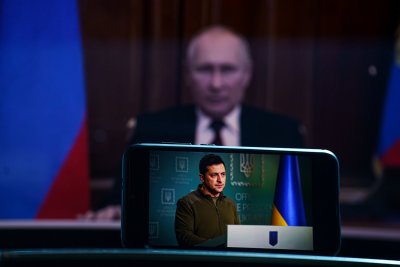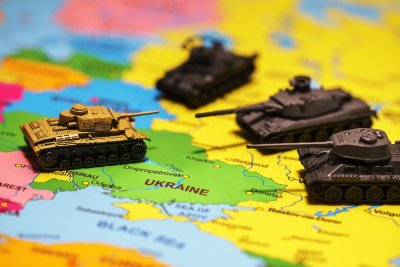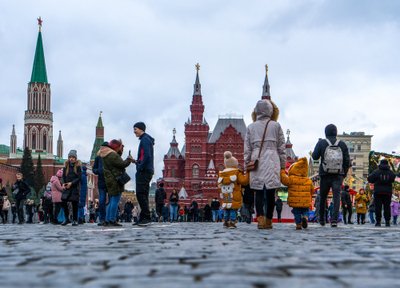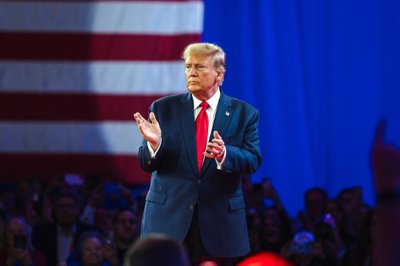– It so happens that our conversation is taking place on the last day of 2024, a time when everyone is reflecting on the past year. Please share your thoughts: was 2024 a worse year for Ukraine than 2023?
– It’s impossible to say whether 2023 or 2024 was better or worse because both years have been years of war. What can be noted is that, from a political perspective, it remains incomprehensible, even after nearly three years of war, why the world reacts so calmly and tolerantly to Russia’s actions. By "the world," I mean the democratic world—why do they tolerate Russia’s behavior so passively? Trade relations with Russia continue, and diplomatic contacts persist. We see Lavrov still attending various summits and Putin still receiving numerous phone calls. For us, this is incomprehensible. Russia openly mocks democratic values. It uses North Korean soldiers in a war in Europe, fires intercontinental ballistic missiles at civilians, and conducts nightly missile strikes on civilian targets. Russia even publicly executes prisoners of war on the battlefield—155 criminal cases have already been initiated regarding such incidents. Yet despite all this, it remains baffling to us why Russia is still allowed to act this way.
On one hand, no truly strict sanctions, including trade embargoes, are imposed; on the other hand, compromises with Putin are continuously sought. The most disappointing aspect of 2024 for me was the constant publication of analytical articles in Western media proposing "great" solutions to end the war. I say this with sarcasm. These articles suggested forcing Ukraine to cede its territories and abandon its right to be a sovereign state, including the right to decide which alliances to join or not join. Such an approach would essentially reward Russia. Meanwhile, these articles fail to mention what needs to be done to compel Russia to abide by rules or international law. This demonstrates that, unfortunately, Western elites do not fully grasp the threats posed by Russia. On the contrary, Russia interprets this as weakness and hesitation and escalates tensions further. For instance, just last week, we saw how Russia provokes in the Gulf of Finland, displays aggression toward Estonia, and threatens with potential attacks, citing the number of Russian-speaking citizens in Estonia and Latvia as a pretext.
All this is disheartening—the world’s reluctance to decisively confront those who violate rules and its unwillingness to demonstrate that modern wars should end differently than they did in the 20th century. Raw force and the aggressor’s willingness to sacrifice lives should not determine the outcome of a war, especially when Western precision weapons are far more effective than Russian ones. Russia deceived the world for a long time, claiming it had "super weapons." In reality, Russia fights in the same manner as it did in the 20th century—sending masses of people to die, reminiscent of Zhukov’s era. This remains a mystery to me. NATO should be prepared to confront Russia now, not in 5, 10, or 35 years. Right now, it is possible to resolve security issues by defeating Russia. If Russia loses this war, there will be no threat of a major war in Europe.

– Currently, there is significant speculation in Ukraine about a possible ceasefire in 2025, with lively discussions in the media. I see how expectations are being set that the war will end on specific dates like December 29 or January 20. Let me ask: what is the likelihood that the war will indeed end in 2025?
– This is an excellent but complex question because not everyone understands what the end of the war means. The Kremlin is currently insisting that Ukraine must lose the war. They argue that despite their own massive losses, they want Ukraine, Europe, and the United States to capitulate to them. It is clear that Ukraine does not have sufficient resources to independently withstand the alliance of Russia, Iran, and North Korea without the support of its partners. However, Ukraine will certainly not surrender. Russia, on the other hand, hopes to break Europe. It exploits Europe’s willingness to negotiate, for example, to regain access to Russian gas or other benefits. Russia also aims to subdue the United States, demonstrating that Russia, not the U.S., dominates the world. Russia seeks to prove that Western rules are meaningless and can be broken by force when necessary.
The problem lies in people’s inability to clearly define what the end of the war entails. For Ukraine, it means the punishment of the aggressor, the restoration of international law, tribunals for war criminals, partial disarmament of Russia, and a transformation of its political system. Without this, the threat posed by Russia will persist.
At the same time, we hear strange discussions in the West. For instance, there are talks about reaching a temporary truce or freezing the conflict. This would mean that Russia does not lose. The question then arises: what happens next? If Russia starts a major war in the 21st century and faces no consequences—no legal, financial, or moral accountability—why should it stop? Russia’s history shows that it can only exist in a state of war, necessary to maintain Putin’s regime. If the aggressor is not punished, there is no reason for it to stop. If Russia initiated a major war in the 21st century with genocidal elements and remains unpunished, why would it cease threatening neighbors like Estonia? If Russia is simply given what it wants—or even part of it—how can it become a peaceful country?
The issue also lies in the illusion, prevalent in the West after the collapse of the Soviet Union, that the era of tough decisions is over. It was believed that small conflicts could be resolved with special forces, large investments in armies and security were unnecessary, and relations with Russia could be maintained peacefully. All this has led to the current crisis. The only solution is that Russia must lose. After that, extensive trials for war criminals and the ideology of the "Russian world" are necessary. This would give Europe the chance to live in peace and freedom for decades to come. Additionally, all efforts must be concentrated on military aid to Ukraine—everything in Western arms depots must be provided to Ukraine. Sanctions must also be comprehensive, with no loopholes in trade or intermediary activities involving third countries. Talks with Russia can only begin when Russia is forced to the negotiating table through military, economic, and diplomatic defeat. Until then, the West must harden its stance and show that responsible decisions are made today, not deferred to future generations.

– You mentioned that the Western media—and Ukrainian media as well—are heavily speculating with Ukrainian territories. Could you tell our readers—and not just our readers, since I know this interview will be quoted by other outlets—whether Ukraine is ready to cede part of its territory to Russia for the sake of peace next year?
– Absolutely not. Let me reiterate: Russia invaded Ukraine with the goal of destroying Ukrainian statehood. They did not fully achieve this goal, but they occupied a significant portion of territory and remained unpunished for it. Russia specializes in diversions, terrorism, and political provocations. What will happen next to Ukraine and Eastern Europe in general? Russia will not calm down.
If Russia is allowed to retain part of the occupied Ukrainian territory, it will view this as an intermediate victory. This will only increase hysteria and aggressive rhetoric within Russia. They are already learning from their mistakes and investing even more in military production and stoking aggression within their society. Russia has essentially become an authoritarian militarized labor camp, where over a million people are directly involved in the war—either currently on the battlefield or having already been there. These people, accustomed to killing and being paid for it, will not return to Russia’s impoverished regions to live in poverty. Russia must find new targets for them and will continue attacking Ukraine. The illusion that "territory for peace" will bring stability will actually lead to more bloodshed. It will inevitably result in the third and fourth stages of the war, expanding the theater of operations to other countries.
Russia has made this clear, yet many fail to take Putin’s and Lavrov’s statements seriously. If a country that can only exist by attacking others and destroying their territory and way of life is not punished, the Kremlin will be encouraged to launch new offensives. Russia was not punished for its aggression against Georgia. It was not punished for constant provocations in former Soviet states. It was not punished for the first stage of the war in Ukraine or the genocidal crimes in Syria. It was not punished for the terrorism it actively spreads in European countries, including poisoning and killing people. Each subsequent step of Russian aggression results in greater escalation.
If Russia is allowed to partially achieve its goals, it will only increase its aggression. Impunity will not lead to Russia becoming a peaceful country but will instead heighten its readiness for new attacks. Peace and stability in Eastern Europe can only be ensured through Russia’s complete defeat.

– The second central topic in Ukrainian media, and not just Ukrainian media, is the inauguration of Donald Trump as the President of the United States, scheduled for January 20, 2025. Some fear that Trump will surrender Ukraine to the Kremlin and Putin. Others believe that Trump will instead corner Russia completely. I understand that as an employee of the Ukrainian Presidential Administration, you must be diplomatic, but could Trump’s inauguration be a turning point for Ukraine or not?
– I believe the inauguration of the 47th President of the United States will open new opportunities for Ukraine. We do not yet know exactly what those opportunities will be, but considering Trump’s understanding of the global political process and America’s role in it, it is clear that his administration will not act according to Putin’s script. Putin’s script involves degrading the reputation of Europe and the U.S., asserting Russian dominance, and rewriting global rules through violence. It includes gathering aggressive states around Russia and resolving global disputes through the rule of force. However, the United States, regardless of who the president is, is not interested in losing its global influence or destroying its reputation. That is unthinkable, especially under Trump’s leadership.
While there is speculation, the situation becomes clearer when one delves into Russia’s actions, motives, and Putin’s psychological state. It is evident that Russia will not accept compromise scenarios that the U.S. might offer, because Russia’s goal is to discredit democracy as a concept, portraying it as weak and incapable of protecting its interests. If the Trump administration counters Putin’s scenario, this could lead to a tougher and more pragmatic position during the tenure of the 47th president. It must be remembered, however, that Putin is not a flexible politician—he is an old-fashioned leader whose logic is based on the principle of "all or nothing."
With Trump, a window of opportunity opens that can be exploited. The costs of the war that democratic countries are currently bearing are significantly lower than what they would have to bear if Russia succeeds in rewriting global rules. If these rules include terrorism, provocations, and wars, it will cost the West much more. If Russia does not lose, it will channel its resources exclusively into escalation rather than cooperation, market development, or technologies. Russia lacks the necessary skills for this—their only "skill" is theft. The story of the creation of the Kalashnikov rifle is also an example of Russia’s ability to steal technologies and claim them as its own.
Therefore, I personally look to the future and America’s role in it with optimism. Defeating Russia in Ukraine and Eastern Europe is a far cheaper and more pragmatic solution than expending resources later on ensuring global security. Such a solution will also bring economic benefits to democratic countries—removing Russia from raw material markets, energy markets, and arms markets will open new opportunities for the U.S. and its allies. Additionally, it would bring stability to Europe and allow the completion of a unified Europe, leading to greater economic benefits for both sides. The capitalization of U.S.-Europe cooperation would reach a higher level, benefiting both parties.

– My last question concerns history and was requested by our media group’s publisher and founder Hans H. Luik, who asked me to pass along his regards and wishes you a Happy New Year. The question is as follows: In May 2022, the U.S. passed the Lend-Lease Act, which created great expectations. Many hoped it would become the cornerstone of Ukraine’s victory, just as it was for the anti-Hitler coalition during World War II. Why didn’t that happen, and who is to blame for the fact that Lend-Lease gave Ukraine nothing?
– This is not about blame or the failure of Lend-Lease as such. Lend-Lease and any formal aid to Ukraine—whether from the U.S. or European countries—depend on the domestic political processes of those nations. The debates and discussions within these countries determined the form of that aid: whether it was project-based support, additional funding, investments, or immediate transfer of arms. It all depends on their internal decisions.
When comparing Ukraine’s Lend-Lease to that of World War II, in 2022 and 2023, Western countries still lacked a full understanding of the threat posed by Russia. Only now are they gradually coming to realize the risks Russia represents and its ideological similarities to Nazism. During the mid-20th century, Hitler’s regime was seen as an existential threat, leading to the destruction of entire nations. In 2022 and 2023, Russia was not perceived in the same way. Russia’s goals—to deprive other nations of their rights, to destroy other countries and ethnic groups—were not yet fully clear to Western leaders. There was no understanding that Russia is not truly part of the modern international community. The war was Russia’s attempt to justify its "special path"—to be an 18th- or 19th-century barbaric empire that does not adhere to international law or humanitarian norms.
Unfortunately, many Western countries saw Russia as just another ordinary nation with which negotiations and cooperation were possible. They believed trade with Russia could be expanded because it sells gas and oil, and its oligarchs buy luxury real estate in Western Europe. This illusion was fueled by decades of Russian influence through culture, sports, and business connections, which made Russia a part of Western daily life. You are absolutely right in saying that if the necessary weapons had been quickly provided to Ukraine in 2022 and all formal obstacles removed, the war would have ended quickly with Russia’s defeat. In 2022 and 2023, Russia was not ready for war. They quickly lost positions, and the only thing that saved them was the hesitation and indecision of Western countries. I would like to remind you again that until mid-2023, specifically until autumn, Russia was not ready for war. They did not know how to fight; yes, they later learned from their mistakes, but at that time, they were losing positions rapidly and failing in everything. Unfortunately, what saved them then was the lack of readiness among coalition countries—Ukraine’s supporters—to assess the threats posed by Russia. They also failed to assess Russia’s weakness at the time and to deliver the necessary weapons to Ukraine quickly enough.
– To clarify: Was Ukraine’s victory in the war too frightening a prospect for Western leaders at that time?
– No, it wasn’t that Ukraine’s victory was too frightening for them. I want to emphasize that the West did not fully understand at the time what Russia truly represents. Unfortunately, the Russian threat was not perceived holistically or deeply. Thus, it wasn’t that they feared Ukraine’s victory or defeat, but rather that they didn’t know how to proceed. Russia was deeply integrated into the European "matrix"—close relations not only in business but also in culture, sports, economy, finance, and more. For decades, Russia had invested enormous resources in building parallel relationships at both state and individual levels. They had created cultural, business, and other ties, making themselves a part of Europe and partly America’s everyday life. Russia was seen as one of their own—a friend, a business partner, and even a companion in daily affairs.
In 2022–2023, Russia’s self-exposure was like tearing a part of itself away for the West. It meant abandoning the previous understanding of Russia, which turned out to be completely wrong. Western elites couldn’t believe that Russia is actually a country that will inevitably choose war if it cannot achieve its goals by other means. If provocations are insufficient, Russia is willing to go to war.
The Baltic States have always had a better understanding of Russia’s nature than other European countries. You know how cynical and dangerous Russia’s "Russian world" concept is—it is inherently violent and hostile; such a Russia can never be a friend or partner. Russia may buy people off and pretend to be friendly, but it is always deceitful. Unfortunately, countries in mainland Europe, such as France, Germany, and Italy, or even the U.S. across the ocean, did not share this understanding. This gradual realization and constant indecision caused delays, which gave Russia the opportunity to recover during 2023. They managed to adapt quickly and update their approach: increasing investments in their military industry, accelerating arms production, and forging strategic alliances with North Korea and Iran to compensate for shortages in arms and resources. They also intensified their propaganda efforts, including within European territories. Continuous delays and postponements in decision-making allowed Russia to recover and strengthen its positions, which they are now actively exploiting.
